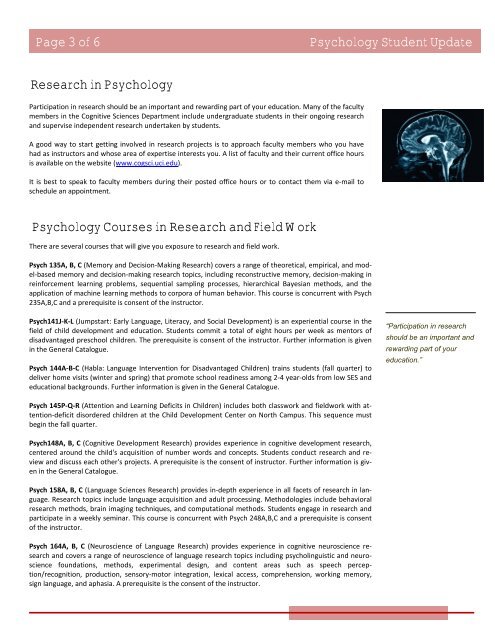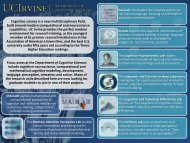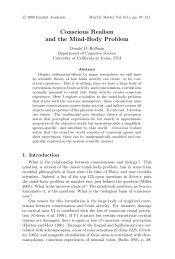Psychology Student Update - UCI Cognitive Sciences - University of ...
Psychology Student Update - UCI Cognitive Sciences - University of ...
Psychology Student Update - UCI Cognitive Sciences - University of ...
Create successful ePaper yourself
Turn your PDF publications into a flip-book with our unique Google optimized e-Paper software.
Page 3 <strong>of</strong> 6<br />
<strong>Psychology</strong> <strong>Student</strong> <strong>Update</strong><br />
Research in <strong>Psychology</strong><br />
Participation in research should be an important and rewarding part <strong>of</strong> your education. Many <strong>of</strong> the faculty<br />
members in the <strong>Cognitive</strong> <strong>Sciences</strong> Department include undergraduate students in their ongoing research<br />
and supervise independent research undertaken by students.<br />
A good way to start getting involved in research projects is to approach faculty members who you have<br />
had as instructors and whose area <strong>of</strong> expertise interests you. A list <strong>of</strong> faculty and their current <strong>of</strong>fice hours<br />
is available on the website (www.cogsci.uci.edu).<br />
It is best to speak to faculty members during their posted <strong>of</strong>fice hours or to contact them via e‐mail to<br />
schedule an appointment.<br />
<strong>Psychology</strong> Courses in Research and Field Work<br />
There are several courses that will give you exposure to research and field work.<br />
Psych 135A, B, C (Memory and Decision‐Making Research) covers a range <strong>of</strong> theoretical, empirical, and model‐based<br />
memory and decision‐making research topics, including reconstructive memory, decision‐making in<br />
reinforcement learning problems, sequential sampling processes, hierarchical Bayesian methods, and the<br />
application <strong>of</strong> machine learning methods to corpora <strong>of</strong> human behavior. This course is concurrent with Psych<br />
235A,B,C and a prerequisite is consent <strong>of</strong> the instructor.<br />
Psych141J‐K‐L (Jumpstart: Early Language, Literacy, and Social Development) is an experiential course in the<br />
field <strong>of</strong> child development and education. <strong>Student</strong>s commit a total <strong>of</strong> eight hours per week as mentors <strong>of</strong><br />
disadvantaged preschool children. The prerequisite is consent <strong>of</strong> the instructor. Further information is given<br />
in the General Catalogue.<br />
Psych 144A‐B‐C (Habla: Language Intervention for Disadvantaged Children) trains students (fall quarter) to<br />
deliver home visits (winter and spring) that promote school readiness among 2‐4 year‐olds from low SES and<br />
educational backgrounds. Further information is given in the General Catalogue.<br />
“Participation in research<br />
should be an important and<br />
rewarding part <strong>of</strong> your<br />
education.”<br />
Psych 145P‐Q‐R (Attention and Learning Deficits in Children) includes both classwork and fieldwork with attention‐deficit<br />
disordered children at the Child Development Center on North Campus. This sequence must<br />
begin the fall quarter.<br />
Psych148A, B, C (<strong>Cognitive</strong> Development Research) provides experience in cognitive development research,<br />
centered around the child's acquisition <strong>of</strong> number words and concepts. <strong>Student</strong>s conduct research and review<br />
and discuss each other's projects. A prerequisite is the consent <strong>of</strong> instructor. Further information is given<br />
in the General Catalogue.<br />
Psych 158A, B, C (Language <strong>Sciences</strong> Research) provides in‐depth experience in all facets <strong>of</strong> research in language.<br />
Research topics include language acquisition and adult processing. Methodologies include behavioral<br />
research methods, brain imaging techniques, and computational methods. <strong>Student</strong>s engage in research and<br />
participate in a weekly seminar. This course is concurrent with Psych 248A,B,C and a prerequisite is consent<br />
<strong>of</strong> the instructor.<br />
Psych 164A, B, C (Neuroscience <strong>of</strong> Language Research) provides experience in cognitive neuroscience research<br />
and covers a range <strong>of</strong> neuroscience <strong>of</strong> language research topics including psycholinguistic and neuroscience<br />
foundations, methods, experimental design, and content areas such as speech perception/recognition,<br />
production, sensory‐motor integration, lexical access, comprehension, working memory,<br />
sign language, and aphasia. A prerequisite is the consent <strong>of</strong> the instructor.







